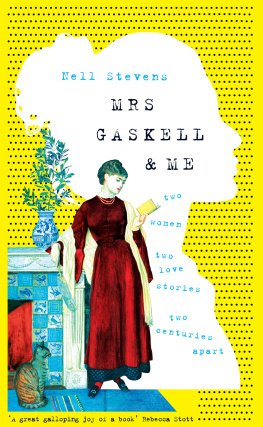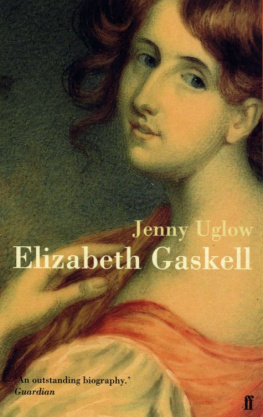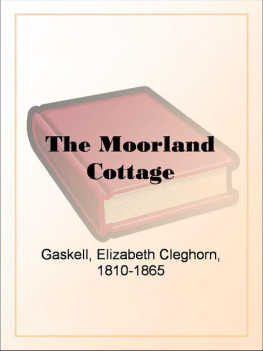Nell Stevens
MRS GASKELL AND ME
Two Women, Two Love Stories,
Two Centuries Apart
PICADOR
For Amanda, Grace & Claudia
Of writing many books there is no end;
And I who have written much in prose and verse
For others uses, will write now for mine,-
Will write my story for my better self,
As when you paint your portrait for a friend,
Who keeps it in a drawer and looks at it
Long after he has ceased to love you, just
To hold together what he was and is.
Elizabeth Barrett Browning
Disclaimer
Do you mind the law of libel? Mrs Gaskell wrote to her publisher, when she was working on her biography of Charlotte Bront in 1856. I have three people I want to libel.
I have no people I want to libel. I have changed names, scenes, details, motivations and personalities. Every word has been filtered through the distortions of my memory, bias and efforts to tell a story. This is as true of the historical material as it is of the sections about my own life: studies, letters and texts excerpted here are not always faithfully quoted. This is a work of imagination.
Two separate parties threatened legal action against Mrs Gaskell when The Life of Charlotte Bront came out in 1857. I want to be like her in many ways, but not that one.
Contents
Part One
BODY STUDY
1855
What You Had
1. A husband
When you wanted to talk about your husband, you talked about sermons. Sermons, you said, bored you. You sometimes called yourself a sermon-hater. In the front row of the Cross Street Chapel, youd fidget, your mind would wander, as your husband, the minister, preached. You mused about the people in the pews around you about their lives and secrets, the things that they were thinking about instead of listening to your husband and when you came back to yourself you found you had missed almost nothing, he was still speaking, the congregation was still waiting in silence, coughing and sighing, crossing and uncrossing their legs.
Sermons, of course, were meant for good; were meant to help you, support you, reform you. And yet, all the same, they were dull, dull, dull, and what you really wanted was to feel something, do something: to be moved, to move, to love.
Your husband: the minister, Mr Gaskell. Sequestered in his study in the middle of your house, in the middle of newly industrial Manchester, square in the middle of the nineteenth century, he was good to the core. He cautioned you when you were reckless or impulsive. He corrected the grammar of your letters before you sent them. He helped you, supported you, reformed you.
And you, Mrs Gaskell, waited outside his study door; you raised a hand to knock, to see if today he would come to the parlour and sit with you and the girls. You wondered whether today, perhaps, you might find in your husband a conversation rather than a sermon. A faint tap, quiet enough that he could pretend, if he wanted, not to hear. You pressed your ear to the wood and listened until it was clear there would be no reply, and then you stood there far longer than you needed to, resting your cheek against the cool surface.
You were always lucky, Mrs Gaskell; you were always grateful for what you had, and yet, all the same, you were restless.
2. A career
Sometimes days on end went by in a blur of what you called Home Life meals and clothes and correspondence, hosting and visiting and by the end of it you were tired and grumpy, but not tired in the way you wanted to be. You lay awake, exhausted, your mind alert. Beside you your sleeping husband was eerily still. His body, his very breathing, was moderate, controlled. You imagined moving away, back to the village where you lived as a child, or even somewhere entirely foreign, where nobody knew you, and you could say you were unmarried and had no responsibilities.
You told stories all the time, to friends, to yourself; you exaggerated in letters, made up white lies that entertained you and seemed to entertain others too; you gossiped unapologetically. None of this was enough. There were stories left over. Lying awake in the night beside the motionless Mr Gaskell, they overwhelmed you, and yet, you craved them.
You began to keep a diary. It was about the children, you said, to people who asked: a record of their development. But it was about you too you couldnt keep yourself and your stories out of it and soon you moved on to articles about culture and country life, and sent them, sheepishly, to magazines. They appeared in print. Next, you published short fiction using a pseudonym: quiet, sad tales about ordinary people like the ones in church, about whose private lives you couldnt help but wonder. And then you wrote a novel called Mary Barton, a great big pounding book about the people around you in the city, the ones you saw crammed into factories and warehouses and tenements, whose griefs you could only, and did, imagine. It became the sort of book that people bought and reviewed and talked about, and all of a sudden you had a career.
This thing you had now, this career, was all your own. It was a portal. It drew you away from Manchester, away from Mr Gaskell, to new places and new acquaintances: painters, philosophers, critics. You became friends with Florence Nightingale. You became friends with Charlotte Bront. At a party in London you met Charles Dickens, who complimented you on Mary Barton and you thought, for the rest of the night, over and over: Charles Dickens has read my book. Charles Dickens has read my book. Charles Dickens. You paid no attention to the earnest, impressed men and women who spoke to you after that. Your mind was fully occupied: Charles Dickens has read my book.
You went home. You wrote more books.
3. A letter
By the time you opened it, the letter was four days old. You had been in Paris and were still giddy from the memory of it. There had been parties in your honour at the house of Madame Mohl, and there had been cream cakes (never enough, but still) and best of all there had been Americans everywhere, intriguing and exotic. You had talked and talked and name-dropped more than you knew you should, and in particular you had boasted of how, thanks to you, your cherished friend Charlotte Bront was happily married and soon to be a mother. Dear Charlotte: you had encouraged and cajoled her towards accepting the proposal of a smart, earnest curate called Mr Nicholls; she had been reluctant; her father had disapproved; you had known better and helped her see that after all the hardship and grief of her life, a drop of domesticity was exactly what was needed. You had not, then, observed any conflict between your personal feelings about Mr Gaskell, and your advice to Charlotte regarding Mr Nicholls.
In Paris, people had listened to you. People had praised you. They had given you cake and sherry. In Paris, there had been all your favourite things at once.
At home, the letter was waiting for you, halfway down a stack of correspondence that had amassed from your weeks away. You worked your way down the pile, scanning for gossip. A girl you had known as a child was having marital problems after running up extravagant debts. A prominent writer was entangled in controversy over whether he was the true author of his works. The daughter of a distant cousin was turning twenty-one and considered pretty, would soon be engaged. And then, there it was: a note to say that your friend, Charlotte Bront, was dead.
4. A project






